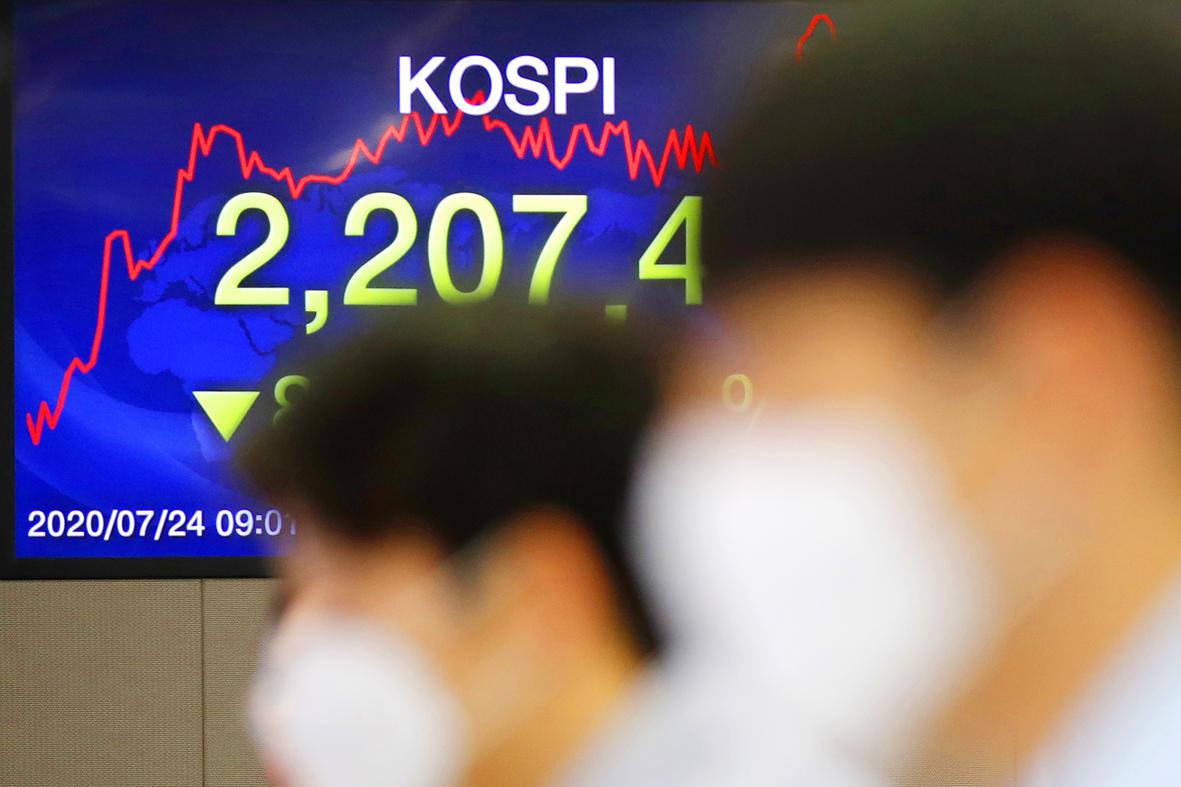Worsening China-US friction, worries over financial aid to Americans and US businesses, and a stumble on Wall Street combined to push shares in Asia lower on Friday.
Shanghai led regional declines, with its Composite Index giving up 3.9 percent to 3,196.77, down 0.5 percent for the week.
The MSCI Asia-Pacific Index lost 0.8 percent to 165.40, up 0.5 percent for the week.

Photo: AP
The TAIEX lost 0.88 percent, or 109 points, to close at 12,304.04, paring its weekly gain to 1 percent.
Officials from the administration of US President Donald Trump have escalated their public condemnations of China in the past several weeks, with speeches by FBI Director Chris Wray, US Attorney General William Barr and US Secretary of State Mike Pompeo.
As expected, China on Friday announced the closure of the US consulate in Chengdu. The move was in retaliation for the US order earlier this week to close the Chinese consulate in Houston, Texas.
The latest dust-up between the world’s two biggest economies comes amid allegations of theft of US intellectual property — including by Chinese researchers with military and government connections — for Beijing’s benefit.
“Alongside the eviction of the Houston Chinese consulate, the risk of the US-China conflict escalating into a ‘cold war’ is worrying,” said Hayaki Narita of Mizuho Bank Ltd.
A speech by Pompeo saying that “securing our freedom from the Chinese Communist Party is the mission of our time” added to the rhetoric certain to incense Beijing, making it still more difficult for either side to back down, he said.
“While the inevitability of deteriorating US-China relations as a structural feature of our geopolitical landscape was never in doubt, the shifts appear to be hastened,” Narita said.
Hong Kong stocks fell on Friday to close the week lower amid the escalating US-China tensions.
At the close of trade, the Hang Seng Index (HSI) was down 557.67 points or 2.21 percent, at 24,705.33. The Hang Seng China Enterprises Index (HSCE) fell 2.37 percent to 10,080.86.
For the week, the HSI lost 1.5 percent, while the HSCE retreated 1.2 percent.
“Another escalation in tensions in the Sino-US relationship is extremely unfavorable to economic recovery under the impact of the pandemic,” China Construction Bank Corp (中國建設銀行) analysts wrote in a note.
The S&P/ASX 200 in Australia gave up 1.2 percent to 6,024, slipping 0.16 percent for the week.
South Korea’s KOSPI on Friday shed 0.7 percent to 2,200.44 and was virtually unchanged for the week.
The FTSE Bursa Malaysia fell 1 percent on Friday to 1,589.61, down 0.5 percent for the week.
India’s SENSEX was little changed on Friday and rose 3 percent for the week. The NIFTY 50 slipped 0.2 percent for the day, but rose 2.7 percent.
Manila’s PSE Composite Index lost 0.4 percent on Friday and fell 1.4 percent for the week.
Markets in Japan were closed for Sports Day.
Analysts said investors are wary over the unclear prognosis for further stimulus for the U.S. economy, just as the end of a previous package of extra support for those made jobless by the pandemic looms.
Additional reporting by Reuters and staff writer

Application-specific integrated circuit designer Faraday Technology Corp (智原) yesterday said that although revenue this quarter would decline 30 percent from last quarter, it retained its full-year forecast of revenue growth of 100 percent. The company attributed the quarterly drop to a slowdown in customers’ production of chips using Faraday’s advanced packaging technology. The company is still confident about its revenue growth this year, given its strong “design-win” — or the projects it won to help customers design their chips, Faraday president Steve Wang (王國雍) told an online earnings conference. “The design-win this year is better than we expected. We believe we will win

Intel Corp chief executive officer Lip-Bu Tan (陳立武) is expected to meet with Taiwanese suppliers next month in conjunction with the opening of the Computex Taipei trade show, supply chain sources said on Monday. The visit, the first for Tan to Taiwan since assuming his new post last month, would be aimed at enhancing Intel’s ties with suppliers in Taiwan as he attempts to help turn around the struggling US chipmaker, the sources said. Tan is to hold a banquet to celebrate Intel’s 40-year presence in Taiwan before Computex opens on May 20 and invite dozens of Taiwanese suppliers to exchange views

Chizuko Kimura has become the first female sushi chef in the world to win a Michelin star, fulfilling a promise she made to her dying husband to continue his legacy. The 54-year-old Japanese chef regained the Michelin star her late husband, Shunei Kimura, won three years ago for their Sushi Shunei restaurant in Paris. For Shunei Kimura, the star was a dream come true. However, the joy was short-lived. He died from cancer just three months later in June 2022. He was 65. The following year, the restaurant in the heart of Montmartre lost its star rating. Chizuko Kimura insisted that the new star is still down

While China’s leaders use their economic and political might to fight US President Donald Trump’s trade war “to the end,” its army of social media soldiers are embarking on a more humorous campaign online. Trump’s tariff blitz has seen Washington and Beijing impose eye-watering duties on imports from the other, fanning a standoff between the economic superpowers that has sparked global recession fears and sent markets into a tailspin. Trump says his policy is a response to years of being “ripped off” by other countries and aims to bring manufacturing to the US, forcing companies to employ US workers. However, China’s online warriors